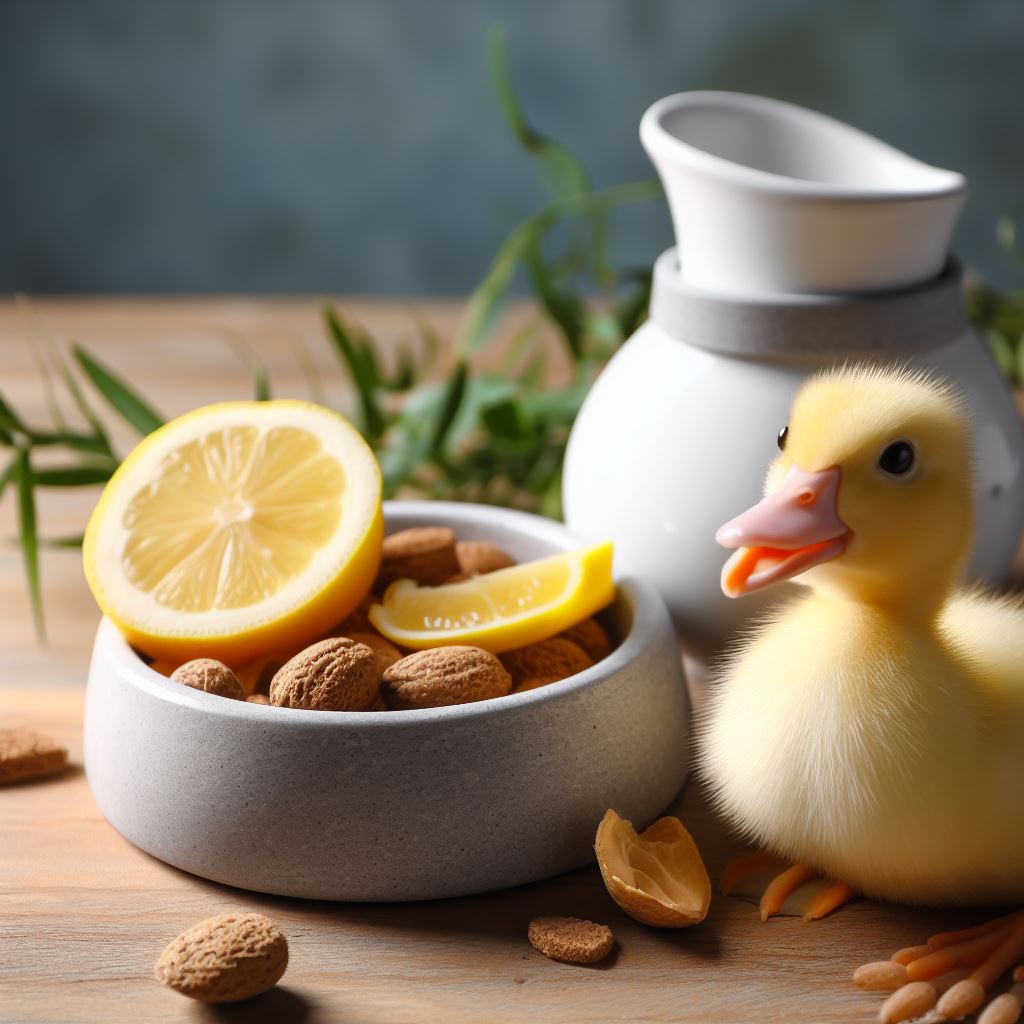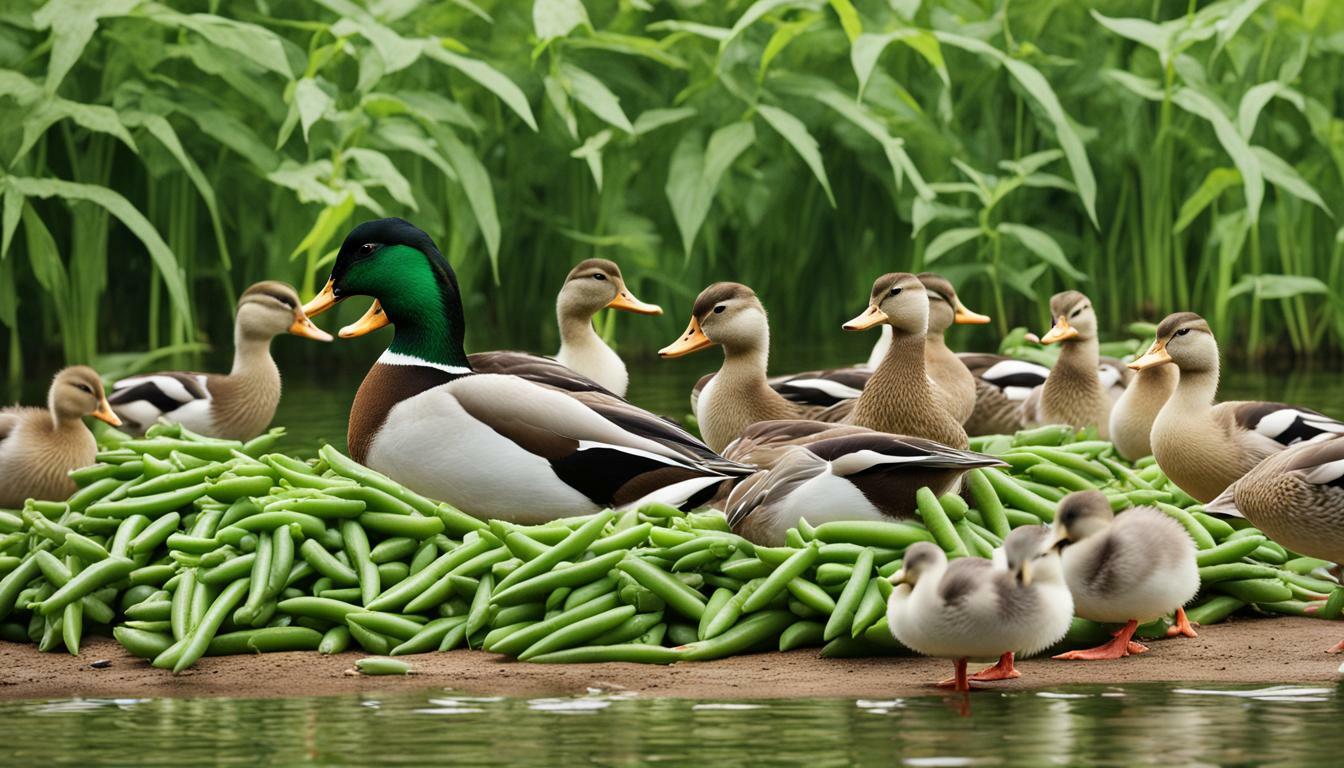Are Orange Peels Healthy or Harmful for Ducks?
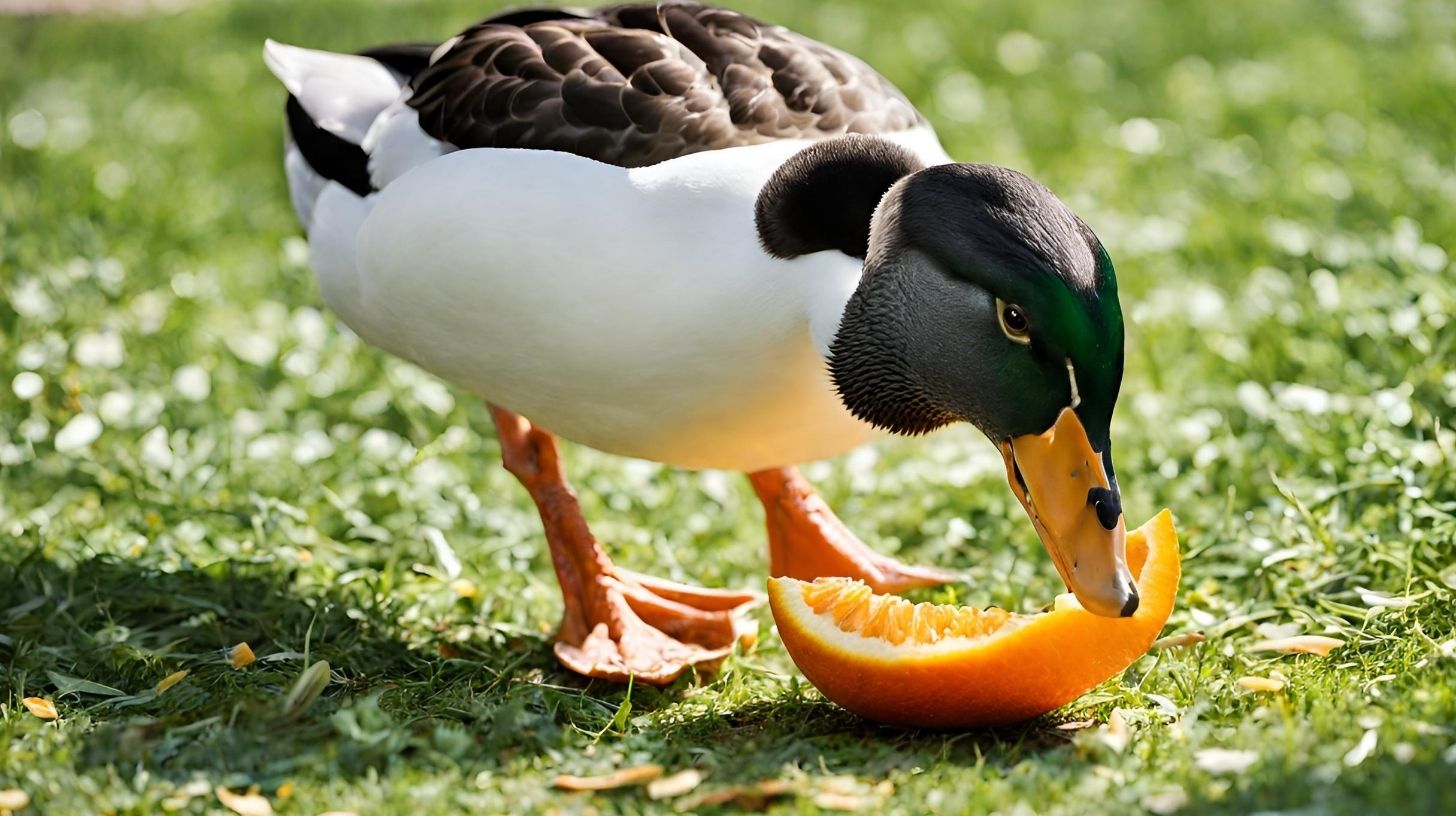
Table of content:
- Do Wild Ducks Naturally Eat Orange Peels?
- Are Orange Peels Safe for Ducks to Eat?
- Do Ducks Eat Orange Peels in the Wild?
- What Do Wild Ducks Eat Besides Bread?
- What Fruits and Vegetables Can Ducks Eat?
- Are Citrus Peels Bad for Ducks?
- Do Ducks Eat Oranges?
- What Food Scraps Can I Feed Ducks?
- Should You Feed Ducks Orange Peels?
- Can Too Many Orange Peels Hurt Ducks?
- FAQs About Ducks Eating Orange Peels
- Conclusion
Ducks can eat orange peels in moderation as an occasional treat, but orange peels should not make up a significant part of their diet. While small amounts of citrus peels are generally not harmful, too much can cause digestive upset and potential health problems for ducks.
Key Takeaways:
- Wild ducks may eat small amounts of orange peels they find while foraging, but the bulk of their natural diet consists of aquatic plants, seeds, and insects.
- Orange peels are not toxic to ducks, but they have low nutritional value and are difficult to digest.
- Citrus peels contain oils that can irritate a duck’s digestive tract if consumed in excess.
- Domestic ducks’ diets should primarily consist of balanced duck feed and treats like oats, corn, grapes, and peas.
- Orange peels can be fed to ducks in small quantities as an occasional snack, but should not exceed 10% of their daily food intake.
- Soaking or boiling orange peels makes them easier to digest for ducks.
- Monitor ducks when feeding any human food scraps to watch for signs of intestinal distress.
Wild ducks eat a varied diet forage from their watery habitats. While domestic ducks can digest a wider range of foods, their dietary needs differ from wild ducks. Understanding what ducks naturally eat and how their digestive system functions provides insight into how orange peels may affect duck health.
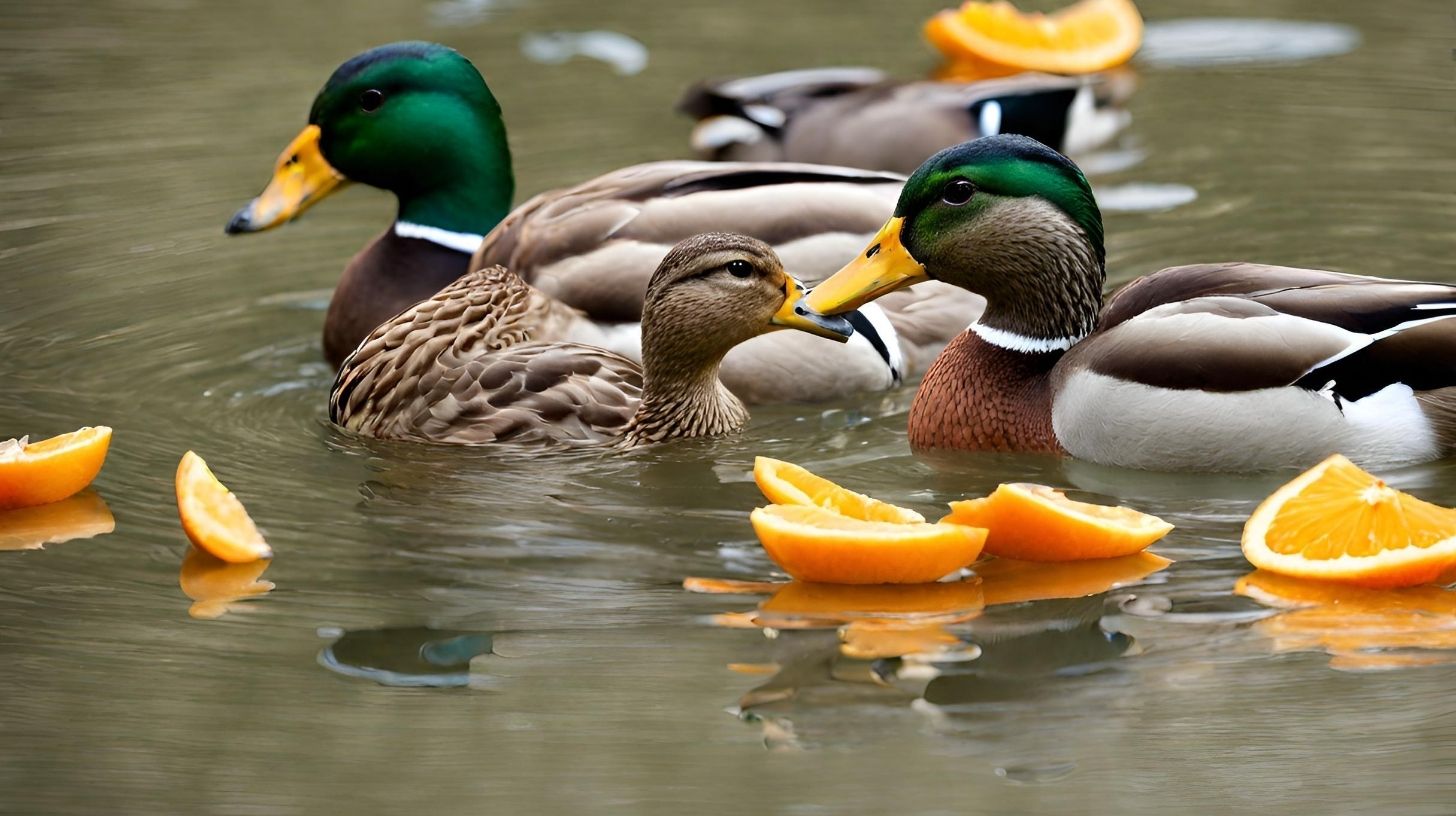 Do Wild Ducks Naturally Eat Orange Peels?
Do Wild Ducks Naturally Eat Orange Peels?
Wild ducks, such as mallards, are omnivorous birds with diverse diets. The bulk of a wild duck’s nutrition comes from aquatic plants, grains, seeds, and invertebrates. Their flexible foraging behavior allows them to thrive in varied wetland ecosystems.
While wild ducks may nibble on citrus fruit waste found in natural habitats, orange peels are not a significant part of their natural diet. Wildlife biologists have identified the following common foods consumed by wild ducks:
- Aquatic Plants: Duckweed, water lilies, eelgrass, algae
- Seeds: Grass, sedge, smartweed, millet, corn
- Insects: Dragonflies, damselflies, caddisflies, mayflies
- Other Invertebrates: Snails, crustaceans, mollusks
- Grains: Rice, corn, wheat
- Berries: Wild grapes, dogwood, sumac
The makeup of a wild duck’s diet varies by habitat and season. But the natural foods wild ducks forage provide a nutritionally balanced diet high in protein, carbohydrates, and fat.
While wild ducks may nibble on citrus peels, orange peels found in nature make up only a tiny fraction of their diverse foraging diet.
Are Orange Peels Safe for Ducks to Eat?
Orange peels are not toxic or poisonous to ducks. However, they have very low nutritional value and are difficult for ducks to digest.
The main safety concerns with feeding orange peels to ducks include:
- Choking hazard from swallowing large, indigestible pieces of peel.
- Intestinal blockages if too much peel is consumed.
- Nutritional dilution when orange peels replace more nutrient-dense foods.
- Digestive upset from excess acid and oils.
Ducks lack teeth and chew food with their bill before swallowing. A duck’s digestive system is geared more towards digesting protein and grains rather than fibrous materials like orange peels.
Orange peels are primarily made of insoluble fiber from the pulp and indigestible oils from the outer rind or peel. The oils in citrus fruit peels contain limonene, a natural chemical that can irritate a duck’s digestive tract.
So while a few slivers of orange peel are not harmful, they have minimal health benefits and are difficult for ducks to break down. Consuming too much can lead to intestinal discomfort, blockages, or malnutrition.
Do Ducks Eat Orange Peels in the Wild?
Ducks are opportunistic foragers and may eat orange peels they come across in ponds and wetlands near human population centers. However, citrus fruit waste makes up only a tiny portion of a wild duck’s varied diet.
In the wild, ducks derive most of their nutrition from natural aquatic and shoreline vegetation. Seeds, insects, and other invertebrates also provide substantial protein and nutrients.
While curious ducks may nibble on discarded citrus peels, these human food scraps are not a meaningful part of their diverse foraging habits. The bulk of a wild duck’s diet consists of nutritious, naturally available foods suited to their digestive system.
What Do Wild Ducks Eat Besides Bread?
Well-meaning people often feed white bread to ducks in parks and lakes. However, bread provides little nutrition and can cause health problems if overfed to ducks.
Here are some healthier and more nutritious foods ducks naturally eat in the wild:
- Corn, oats, rice, wheat – Natural grains high in energy.
- Grapes, berries, chopped fruit – Provide vitamins and antioxidants.
- Peas, chopped lettuce or greens – Fresh vegetables add nutrients.
- Cracked corn, barley, chopped greens, birdseed – More nutritious than bread.
- Duck feed pellets – Commercially formulated complete nutrition.
- Insects like mealworms – Natural source of protein.
Avoid overfeeding any human foods, including healthy options. Provide no more than ducks will consume in a feeding or small handful per duck.
Offering a variety of grains, greens, fruits, and insect protein sources is healthier than just feeding bread to ducks. This provides balanced nutrition similar to their diverse natural diet.
What Fruits and Vegetables Can Ducks Eat?
Ducks can safely eat a variety of fruits and vegetables in moderation as part of a balanced diet:
Fruits:
- Grapes, halved to avoid choking.
- Berries such as chopped strawberries, blackberries, and blueberries.
- Slices of apple, pear, peach, nectarine, banana, and other soft fruits.
- Frozen peas or corn.
- Chopped melons.
Vegetables:
- Chopped lettuce or kale.
- Sliced bell peppers or green beans.
- Carrot slices or shredded carrot.
- Cooked sweet potato chunks.
- Chopped tomato.
Fruits and non-starchy vegetables provide beneficial vitamins, minerals, and antioxidants for ducks. Feed fruit and vegetable scraps in small quantities, limiting to 10% of total food per day.
Avoid dry beans, avocados, onions, uncooked potato peels, salty foods, or moldy produce. Introduce new foods gradually to observe for any digestive issues.
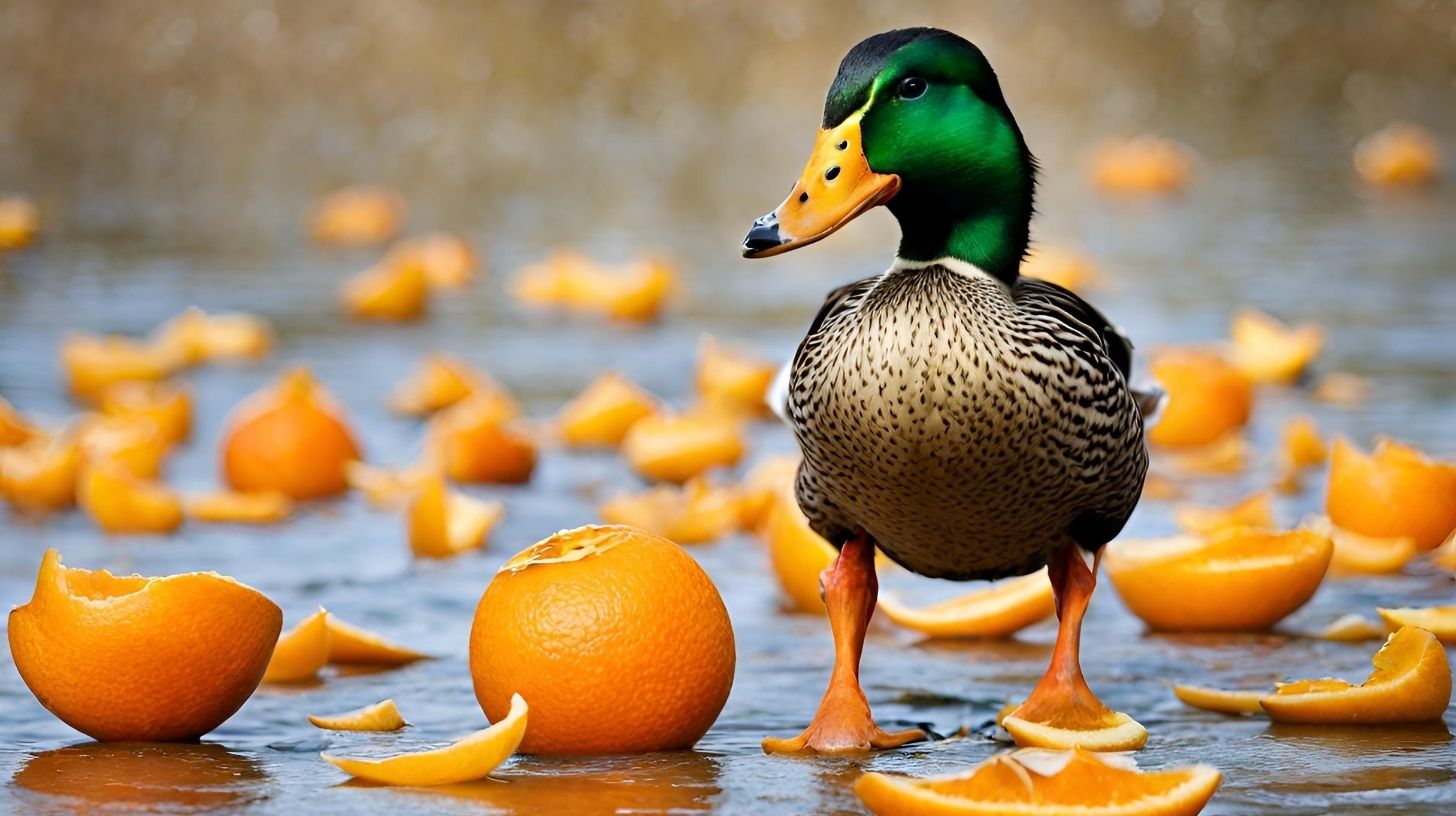 Are Citrus Peels Bad for Ducks?
Are Citrus Peels Bad for Ducks?
Citrus fruits like oranges, lemons, limes, and grapefruit have very acidic juice and peels that can irritate a duck’s sensitive digestive tract. So citrus peels are not highly recommended as regular feed for ducks.
However, when given occasionally in moderation, small amounts of citrus peel are not toxic or immediately harmful:
- Orange peels provide vitamin C and enhance flavor of prepared duck feed.
- Lemon or lime peels add fresh flavor to water.
Possible risks of too much citrus for ducks include:
- Intestinal irritation from acids and citrus oils.
- Choking on large, fibrous pieces of peel.
- Nutritional dilution when peels replace proper duck food.
- Excess carbohydrates and limited nutrients.
If feeding citrus scraps, limit to a few small pieces per duck, 2-3 times per week at most. Never let citrus scraps exceed 10% of daily food intake.
Do Ducks Eat Oranges?
Ducks can eat oranges, but the flesh and juices are acidic and loosen duck droppings. For pet ducks, oranges are best enjoyed as an occasional treat in moderation.
The watery flesh and sugary juice of oranges have very low nutritional value for ducks. Too much can lead to wet, loose stools.
For ducks that enjoy the flavor, some safer ways to offer oranges include:
- Chopped orange segments, removing any seeds.
- Mix a few tablespoons of orange juice into duck grain feed.
- Float thin orange slices in duck water source.
- Add grated orange peel to provide scent and vitamin C.
Never hand feed adult ducks whole oranges. Peel any oranges before feeding to ducks to avoid a choking hazard.
Monitor duck droppings when providing any high-sugar fruits like oranges. Reduce portion sizes if stools become very loose or wet.
What Food Scraps Can I Feed Ducks?
Ducks can safely eat small amounts of many kitchen vegetables and grain scraps as an occasional treat. Here are some healthy duck scraps:
- Corn, rice, pasta – Starchy carbohydrates.
- Leafy greens, lettuce, kale – Vitamin-rich.
- Chopped tomatoes, peppers, beans.
- Wheat bread or muffins, not white bread.
- Crumbled cornbread or crackers.
- Fresh or frozen peas, carrots, lima beans.
- Oats, barley, quinoa, cooked grains.
Avoid salty foods, avocados, dry beans, citrus fruits, onions, and moldy or rotten produce. Introduce new food scraps gradually and monitor for any digestive issues.
Never overfeed human food scraps, as nutritional imbalance can harm duck health. Best practice is to limit scraps to a handful per duck, providing variety and moderation.
Should You Feed Ducks Orange Peels?
Orange peels are not toxic or immediately dangerous for ducks. However, they provide minimal nutritional value. Ducks have difficulty digesting the fibrous citrus peels.
Small amounts of orange peel can be fed to ducks as an occasional treat in moderation. But orange peels should never become a significant portion of any duck’s diet.
If offering orange scraps to backyard ducks, follow these best practices:
- Peel the oranges first and chop peels into small pieces.
- Soak peels in water for easier digestion.
- Limit peeled oranges to one per duck, 2-3 times per week.
- Make sure ample duck feed and clean water are always available.
- Never allow citrus scraps to exceed 10% of total food.
Monitor ducks closely when offering any human food scraps. Reduce portions or discontinue use if loose droppings or other digestive issues occur.
For optimal nutrition, a commercial duck feed should provide the bulk of food with fruit and veggie scraps as occasional variety. Avoid overfeeding bread or junk foods.
Can Too Many Orange Peels Hurt Ducks?
Feeding excessive amounts of orange peels can harm duck health. Ducks require a balanced diet, and orange peels provide very limited nutritional value while posing some risks.
Potential problems from overfeeding orange peels to ducks include:
- Nutritional deficiencies if peels displace proper duck food.
- Digestive upset and irritation from excess citrus oils.
- Risk of choke or intestinal blockage from too much fibrous peel.
- Excess carbohydrates leading to obesity.
- Loose, wet droppings from excess fruit sugars and juice.
To avoid health problems, orange peels should never exceed more than 10% of total food volume per duck. That would equal about 1 medium orange peel per 3 lbs of proper duck food.
For most backyard ducks, limit orange peel treats to a few times per week. Discontinue use if digestive problems arise. Maintain a species-appropriate base diet and monitor body condition.
While orange peels are safe for ducks in moderation, they do not provide complete nutrition. Prioritize proper duck feeding practices for long-term health.
FAQs About Ducks Eating Orange Peels
Can I give whole oranges to ducks?
No, we do not recommend giving whole oranges to ducks. The flesh and juices are acidic and loosen droppings. Whole oranges also pose a major choking risk. Always peel oranges and chop the peel into small pieces before feeding to ducks.
How much orange peel can ducks eat safely?
As an occasional treat, ducks can safely eat one medium-sized orange peel 2-3 times per week at most. Never allow citrus scraps to exceed 10% of total daily food volume per duck.
Is orange peel better for ducks than bread?
Yes, small amounts of orange peel are better than white bread in nutritional value. But for optimal health, ducks should primarily eat commercial duck feed, supplemented with vegetable and grain scraps.
Can too much orange peel cause vitamin deficiencies in ducks?
Yes, excessive orange peel could potentially cause vitamin deficiencies if it replaced proper duck feed. Orange peels have almost no protein, few vitamins, and minimal minerals – simply fiber and sugar.
Do you need to boil orange peels before feeding ducks?
Boiling or soaking orange peels makes them softer and easier to digest for ducks. It also reduces the citrus oils that can irritate their digestive system. Not required, but recommended.
Conclusion
For wild ducks, orange peels from urban waste make up only a tiny portion of their diverse foraging diet. Domestic ducks can eat small amounts of orange peel safely as an occasional treat. But citrus scraps should never become a primary component of any duck’s diet.
While not toxic, orange peels have very limited nutritional value and are difficult for ducks to digest. Excess peels can cause digestive upset and health issues over time. Feeding orange peels to ducks is acceptable in strict moderation, but proper duck feed should be the dietary foundation. Monitoring portions and duck health remains important when supplementing with any human food scraps.
Welcome. I’m Adreena Shanum, the proud owner of this website, and I am incredibly passionate about animals, especially poultry. I founded adreenapets.com as a labor of love, stemming from my desire to share my knowledge and experiences with poultry enthusiasts worldwide.


